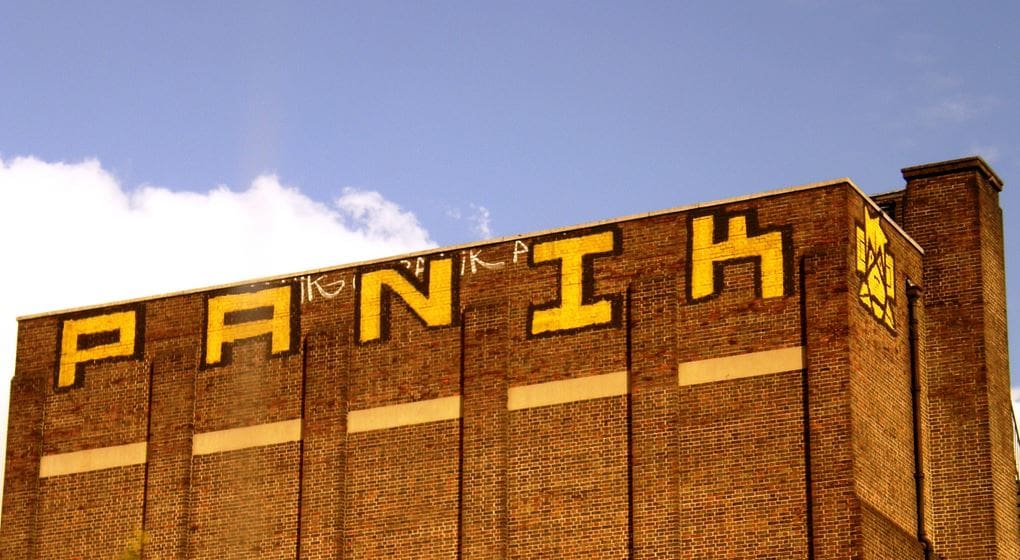Critique and Panic
On the state of the radical milieu in Switzerland, or: How the lack of debate makes room for authoritarianism and sclerotic politics
by Klaus Klamm for Ajour Magazin (Switzerland)
1 June 2017 (original post)
When Ajour Magazin came online in March, there was excited anticipation about how the publication would advance debate and education on the radical lefti in Switzerland. In the run-up to the launch, anyway, it was rumored among more informed circles that this would be the aim of the new magazine. Finally, this intention appeared explicitly on the project’s website: “Ajour will keep you up to date, will engage in critique, and foster debate” is right there on the About page. After a couple of months, however, a certain sobriety has set in. Alongside the demonstration reports, research articles, and interviews, there doesn’t appear to be much in the way of anything one could call debate or critique in the narrow sense.
Among the Ajour editors there are minds fully capable of exegesis and critique. But there seems to be some kind of blockage. Is it because of the simple calculus that theoretical inveighing tends to measure poorly against demo reports in terms of traffic and clicks? Or is it a fear of expressing views that could cause discord in the relatively close-knit scenes in Zurich and elsewhere? Or is it simply an insecurity in their ability to formulate bold arguments? Presumably there are multiple factors at play.
It would be wrong, however, to lay blame for the general lack of debate at the Ajour collective’s feet, even though their hesitancy is contributing to the current state of affairs in local discourse. The absence of committed inquiry here points to a much deeper problem: the inability of the Swiss radical left to take criticism and thus extend its understanding, sharpen its arguments, and in some way enter into an exchange of ideas that is conducive not just to the consolidation of its own position but, more importantly, to a better understanding of the world.
To point out this circumstance doesn’t win a radical leftist here that many friends. To declare its existence and work towards overcoming it will indeed probably cause precisely the kind of discord we seem to prefer to avoid. Nevertheless, I will attempt to do just this in what follows, in hopes that the predictable backlash will break not the messenger but this awful deathly silence.
Theory and Activism: Suspension of revolutionary dialectic
First some prep-work: in Switzerland—a land of lazy thinking habits and anti-intellectualism—it is necessary to sketch out roughly why knowledge (and therefore the debate I am calling for) is at all important, because it could serve in the examination of both one’s own previous perceptions as well as the insights of others. Primarily, it should be obvious that we will be much better equipped to fight capitalism if we understand it somewhat and do not confuse [notorious Swiss banker] Josef Ackermann with the concept of capital ratio. In order to develop an adequate strategy, we must be familiar with not only the defenders of the status quo but also the social dynamics of the status quo they are defending. In addition to that, it would be advantageous if our own analysis and agitation had something to do with real circumstances and not just the half-correct hand-me-down thoughts of dead men—we do want to be listened to, after all.
The high turnover within the radical left might be related, among other things, to the fact that its most active protagonists tend to define themselves by the impulse to charge wildly at the especially atrocious. In some of the worse cases, they are only on the lookout for issues that are most useful for the endless reproduction of the same forms of activism. In this mode of action, one merely asks the question: which alarming information will mobilize the most people? But the disquieting permeation through society of those material conditions that must be forcefully opposed isn’t really happening here to nearly the same extent as elsewhere, so this is a pretty unstable basis for long-term political activity. This is demonstrated frequently by the eventual defection of rebellious students or youth activists into the hard workaday world, which is of course often accompanied by their full abandonment of the radical milieu. Another thing that attests to this is the quite frictionless transfer from political activism into the extraneous “outlaw” existence of the football hooligan or pubcrawler. Still further evidence of this problem are the so-called militant demos—which, of course, are appropriate and necessary in certain situations—and their overwhelmingly, perennially young participants.
This is all directly observable, but it amounts only to a somewhat superficial argument. Because knowledge—let’s call it by its more common name among radical leftists: theory—is not something sitting outside the world, something that is developed in the mind and that only through its practical application comes into the world. Theory and praxis are not that starkly separate. Knowledge and action presume as well as produce one another. Whether it’s building a fire or building electronic equipment: there is no flame without theoretical knowledge of tinder, and no development of a machine without its practical utility being evaluated. In the past, revolutionary theory—in the form of strategic postulates—and practical struggle could be mutually propulsive. Or, as a certain Karl Marx once said, “Theory becomes a material force when it takes hold of the masses”—and, likewise, the practical transformation of the world leads in turn to new insights.
Unfortunately, this correlation of revolutionary theory and praxis in Switzerland is rather thoroughly ruptured;ii activism and theory stand quite stiffly apart in the minds of most leftists. This is why what these movers do is merely activism and not what they claim to be undertaking: revolutionary praxis.
Some agonize over strategies for social democracy or one of its minor facsimiles, and delude themselves about its power to change society. Others organize the hundredth demonstration and worry mostly about the growth of their own group, while hyperbolizing their make-work-for-activists program as “revolutionary praxis.” Still others have made themselves comfortable in their leftist biotopes, and cultivate the feeling of resistance in the form of fashion, rule-breaking, and musical taste, without even registering the generalized calamity happening around them. And some—of whom there are admittedly few within the Swiss radical left—have buried themselves so deeply in books that they have become biblical radicals whose feet barely touch the ground, let alone the street.
What they all have in common is that they no longer understand revolutionary praxis and revolutionary theory as a mediated unity. This is only partly their fault; rather it is a problem of our current social reality. These fossilized souls just won’t start dancing, no matter how often or loudly one sings them their reveille. Still, one needn’t retreat from one’s own social impotence directly into self-restrained lassitude.
Patience and Irony: There’s no other way for now
A first step out of this self-imposed ghetto would be the attempt to overcome one’s own conceited insularity through intercourse with others so afflicted. Instead, unfortunately, the same dogged clinging to peer-groups and identities is evident all around. The problem is familiar to anyone who has spent any time among radical leftists in Switzerland: criticism is often taken as malicious slander of a person or group; the response is generally an attack on the critic rather than any substantive self-inquiry.iii The critic gets branded as disloyal, is implied to have done damage to the praxis in question, or is regarded as a snobby intellectual. This of course might have something to do with the activist who was criticized feeling that their life’s project is under threat or that their daily exertion in service of a better world—and ultimately their very identity—is being called into question.
In order to avoid this state of panic, there are two attributes to be nurtured, without which we anarchists and communists will shortly die of heart failure: patience and self-irony. Perhaps we could benefit from the simple insight that at the present moment and in the current situation there is little we can change with revolutionary intent. History shows, however, that this can change in the blink of an eye, even when all signs point to a reactionary onslaught. So maybe we should all take a breath and stop feeling like (and acting like) Lenin when he arrived in Petrograd in 1917. Even if we can’t quite allow ourselves to fully apprehend our own and our society’s insignificance, let’s not flail around in panic and lapse into illusion.
Patience and self-irony are prerequisites to being able to acknowledge arguments against activist rituals and the atrophy of debate. It would also mean that political arguments would no longer turn on whether they are somehow useful to the current mode of activity or one’s preferred political formations. Because it could very well be that insights about the possible prospects of a certain practice are meaningful beyond the next demonstration, meeting, or event. Naturally, theory—however it is mediated—must be measured by whether it advances the conclusions of a practical outlook, even if some see it wholly otherwise and prefer to pout. Refusing to smile and nod along with the current make-work program of the radical left and preferring to accompany it with critical commentary is not the same thing as “withdrawing into an ivory tower,” even if this also means pointing out where the radical left’s weaknesses are. This has nothing to do with “disloyalty” or lack of solidarity; rather it means one has come to certain conclusions as a result of thoughtful appraisal. One formulates these conclusions as critique, from which—under better circumstances—a fruitful debate could emerge. On the Swiss left as it currently stands, the critic gets banned or labeled an unsolidary academic.
This is another totally wrong-headed viewpoint, by the way: as if an irksome critical perspective has to have something to do with those factories, the universities. Here people seem to mistake what is actually their anti-intellectualism (and their hatred for dissenting critical ideas) for a critique of the academic system—a critique of the fact that under capitalism, knowledge production gets separated from society, stashed away among special people in special institutions, and only recognized in a certain, narrow form. One should not confuse this critique with one’s resentment of certain ideas.
Pomp and Circumstance: the dogmas of dead men
It is not only the described defense mechanisms that have produced the current state of our discursive culture. A not insignificant part of it is also due to the fact that the radical left is one segment of the larger Swiss society and reproduces this society’s own limitations in a special way. The state of the broader Swiss discursive culture can be marveled at on television programs and the feature pages of local print media. But the radical left is a specific part of bourgeois society. It is a space where reality is filtered through the prism of dusty dogma, and flows thus deformed into the pamphlets we publish. If there is ever a debate, then it takes place unfailingly dressed in the musty vestments of a communist or anarchist traditional lexicon, and its outcomes can be predicted with fatal accuracy and will mostly have very little to do with any real course of events.iv
This is not an appeal in favor of the insults disguised as theories which appear with the prefix post—whether it is -Marxism or -Operaism that trots along behind it. I am simply pleading that we reexamine certain comfortable certainties—just as two quite famous communists named Georg Lukács and Karl Korsch were already demanding shortly after the Russian revolution, by the way (with little success, as we know nearly a hundred years later, given the tragic trajectories of both Lukács himself and the Party he was addressing).
It should be clear, then, that these lines are being written by someone who feels a certain commitment to anti-authoritarian communism—in other words, those communist currents which were already fighting state- and party fixations at the beginning and whose prognoses were proven correct by the ultimate trajectory of the Soviet Union and its ideological heirs; those currents which always criticized dogmas like today’s completely deranged, nation-oriented version of anti-imperialism or the blind faith in labor unions and authority and always attempted to supplant these dogmas with calls for the autonomy of the proletarianized; those currents, finally, which were always regarded as heretical and have consistently been fought (with deadly force if need be) by the Communist canon—while anarchists eyed him warily and suspected authoritarianism behind his friendly facade (although there has also been plenty of overlap and cooperation).
It is in the name of these currents that I appeal for a return to the joy of debate. Because only a collective reflection on our own positions as well as the apprehension of theory by each individual—also in the course of discussion—can work against paralysis, authoritarian structures, and informal hierarchies. We should not leave strategic analysis only to those who have graduated with a degree in Marxism-Leninism; we should, each and all, take possession of historical and contemporary radical thought and its vision, and bring ourselves in, each and all, with this knowledge—even if, according to the stipulations of some so-called “freedom of propaganda,” it shouldn’t be discussed. We should also not leave the speaking and thinking to a certain few in less formal situations, because this is how the nicest anti-authoritarian projects sink into informal hierarchies. Let’s begin to make the world our ownv by making it comprehensible—collectively.
Translated by Antidote
Featured image source: Panik ATG (Flickr) via Ajour Magazin
***
i For the purposes of this text, this is meant as a broad category that includes everyone in Ajour‘s audience
ii A strike in the SBB Cargo warehouses a few years back showed that it doesn’t always have to be this way. After 2008, something resembling a dynamic of truly self-aware struggle developed there. Many groups on the radical left stumbled on this event out of their commitment to class struggle; a few even suspected that there might be something really special going on.
iii This tough defensiveness can also be explained by the fact that fans of this society try to make anti-capitalist positions seem ridiculous. But an enemy of liberation denigrating the revolutionary project, and a radical criticizing certain aspects or kinds of radical activity in order to move the project forward, are two different things.
iv This isn’t the place to go in-depth on this, but: the classical radical theories—and indeed not only those of the various successor-factions of the Bolsheviks but also those of their left opposition and their successors—arose under conditions which, as regards both the ideas’ acolytes themselves and their social circumstances, have very little in common with the situation we face today. This is a hit to theory as political guidance, but not to the fundamental insights within critiques of political economy or the materialist critique of the state—which have their value—as long as we continue to grapple with their substance.
v Translator’s note: “Aneignung der Welt” is a Hegelian phrase meaning basically the “appropriation of the world” and there has been a fair amount of philosophical wrangling over its interpretation, not least by Marx. It has come up in the pages of Antidote previously, in another article translated from a Swiss author, that turns its weighty, ambiguous significance into irreverent wordplay. If you prefer to be serious about it, though, check out e.g. this excerpt of Stalin biographer Robert C. Tucker’s essay on Marxian revolution, it’s SUPER FUN STUFF (and just happens to reflect some of Herr Klamm’s own arguments above):
“Appropriation (Aneignung) was not something going on in the philosopher’s mind; rather, the Hegelian notion of the cognitive appropriation of the world by Spirit was an inverted representation of the material appropriation of objects in history, the accumulation of capital. Further, the overcoming of alienation was not a process that could take place simply in thought. As the alienated world was a world of real material things and productive powers, the appropriation of it by the exploited and alienated producers, the proletarians, would have to take place in a real revolution—a Communist revolution consisting in the worldwide seizure and socialization of private property.”





